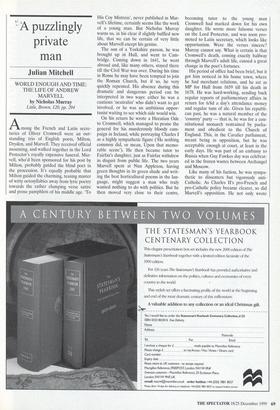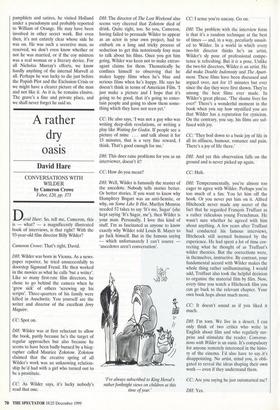A puzzlingly private man
Julian Mitchell WORLD ENOUGH AND TIME: THE LIFE OF ANDREW MARVELL by Nicholas Murray Little, Brown, £20, pp. 294 Among the French and Latin secre- taries of Oliver Cromwell were an out- standing trio of English poets, Milton, Dryden, and Marvell. They received official mourning, and walked together in the Lord Protector's royally expensive funeral. Mar- vell, who'd been sponsored for his post by Milton, probably guided the blind poet in the procession. It's equally probable that Milton guided the charming, teasing master of witty octosyllabics away from lyric poetry towards the rather clumping verse satire and prose pamphlets of his middle age. 'To His Coy Mistress', never published in Mar- vell's lifetime, certainly seems like the work of a young man. But Nicholas Murray warns us, in his clear if slightly baffled new life, that we can be certain of very little about Marvell except his genius.
The son of a Yorkshire parson, he was brought up ill Hull, and went to Cam- bridge. Coming down in 1641, he went abroad and, like many others, stayed there till the Civil War was over. During his time in Rome he may have been tempted to join the Roman Church, but if so, he very quickly repented. His absence during this dramatic and dangerous period can be interpreted in two ways: either he was a cautious 'neutralist' who didn't want to get involved, or he was an ambitious oppor- tunist waiting to see which side would win.
On his return he wrote a Horatian Ode to Cromwell, which managed to praise the general for his murderously bloody cam- paign in Ireland, while portraying Charles I as a highly sympathetic figure (Tie nothing common did, or mean, Upon that memo- rable scene'). He then became tutor to Fairfax's daughter, just as Fairfax withdrew in disgust from public life. The two years Marvell spent at Nun Appleton, having green thoughts in its green shade and writ- ing the best horticultural poems in the lan- guage, might suggest a man who truly wanted nothing to do with politics. But he then moved very close to their centre, becoming tutor to the young man Cromwell had marked down for his own daughter. He wrote more fulsome verses on the Lord Protector, and was soon pro- moted to Latin secretary, which looks like opportunism. Were the verses sincere? Murray cannot say. What is certain is that Cromwell's death, coming exactly halfway through Marvell's adult life, caused a great change in the poet's fortunes.
His period of office had been brief, but it got him noticed in his home town, where he had merchant relations, and he sat as MP for Hull from 1659 till his death in 1678. He was hard-working, sending back regular reports of parliamentary affairs in return for 6/8d a day's attendance money and regular tuns of ale. Given his republi- can past, he was a natural member of the 'country' party — that is, he was for a con- stitutional monarch restrained by parlia- ment and obedient to the Church of England. This, in the Cavalier parliament, meant being in opposition, but he was acceptable enough at court, at least in the early days. He was part of an embassy to Russia when Guy Fawkes day was celebrat- ed in the frozen wastes between Archangel and Moscow.
Like many of his faction, he was sympa- thetic to dissenters but vigorously anti- Catholic. As Charles II's pro-French and pro-Catholic policy became clearer, so did Marvell's opposition. He not only wrote pamphlets and satires, he visited Holland under a pseudonym and probably reported to William of Orange. He may have been involved in other secret work. But even then, it's not entirely clear whose side he was on. He was such a secretive man, so reserved, we don't even know whether or not he was married, or if the coy mistress was a real woman or a literary device. For all Nicholas Murray's efforts, we know hardly anything of the internal Marvell at all. Perhaps he was lucky to die just before the Popish Plot and the Exclusion Crisis or we might have a clearer picture of the man and not like it. As it is, he remains elusive. The grave's a fine and private place, and we shall never forget he said so.























































































































 Previous page
Previous page